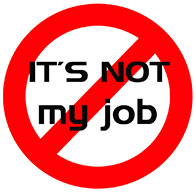 “That’s not my job.” Is there any phrase more destructive in the workplace? If that phrase is the worst, then “That decision is above my pay grade” has to come in second place. Both phrases are heard frequently, and both do nothing more than alienate teammates, punish customers, and disrespect the company as a whole.
“That’s not my job.” Is there any phrase more destructive in the workplace? If that phrase is the worst, then “That decision is above my pay grade” has to come in second place. Both phrases are heard frequently, and both do nothing more than alienate teammates, punish customers, and disrespect the company as a whole.
CEOs want their leaders to think like an owner because it creates a unique mindset. Whether it’s a small business or a Fortune 100, when you think like an owner, you take ownership of your job, your attitude, your employees, and your customer. When you’re an owner, your reputation is intrinsically tied to the reputation of the business. You treat every customer like they’re the most important, you’re mindful of every dollar spent, and you never forget that your employees are your greatest asset.
But telling leaders to think like an owner isn’t a new concept. It isn’t even a challenge if you’re hired the right people. What is challenging is creating a culture of ownership at all levels of your organization.
Take a look at the roles with the highest turnover in your organization. Those employees feel no personal responsibility for the success or failure of the organization. Why is that? They may be paid well. They may generally like their managers. They may even like the work that they do, but something is missing. If your employees were happy and felt connected to your brand, they would stay.
For many, it comes down to empowerment. When a customer needs a unique solution or has a complaint, how many levels of approval do your front-line employees have to go through to deliver what the customer wants?
I was in an office supply store recently, and an elderly woman purchased a giant box of printing paper. She had help from a store employee to load that box in her cart. After she paid for the item, she asked for help getting the box in her car. The employee immediately looked uncomfortable and started looking around. He sheepishly explained that “regular employees” are not allowed to leave the store while they’re on the clock. He had to find a store manager for help. After requesting assistance from a manager 3 times on the intercom, I asked if the greeter at the front door or the 2 people stocking shelves nearby could help her. He said no, those were just “regular employees” too. I ended up helping the woman to her car myself. When I returned to make my purchase, the “regular employee” looked defeated and ashamed. He kept saying “if I could have, I would have.” All he wanted to do was help. He even said a coworker had recently been disciplined for helping a customer to their car.
When I left the store, the term “regular employee” echoed in my head. This employee has been “Policied and Procedured” into submission. The only role he filled was the CEO of Transactions. It’s not that he didn’t want to make the customer happy. He couldn’t. He wasn’t empowered to do so. He was just a “regular employee.”
Regular employees don’t care when theft occurs. They don’t care when the company receives negative press. They are unaffected when stock prices plummet. And when an unhappy customer leaves, they just move on to the next person in line, because that’s their job. Regular employees don’t feel passion; they trade time for money. They don’t make suggestions to improve the business. They don’t put the customer’s needs first because they’re not allowed to. And this is why regular employees leave.
Why should a regular employee take ownership of a company that doesn’t trust them enough to take care of customers?
It’s not enough for you to think like an owner. You have to select the right people, train them well, trust and empower them so they can think like an owner as well. Leadership at all levels must be identified, supported and rewarded. Otherwise the only thing you will own is a sea full of “regular employees.”
